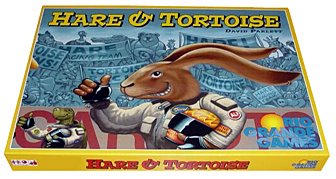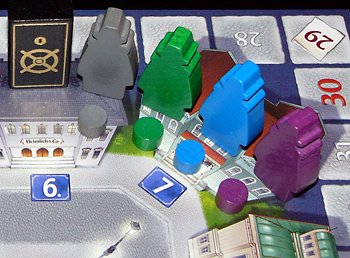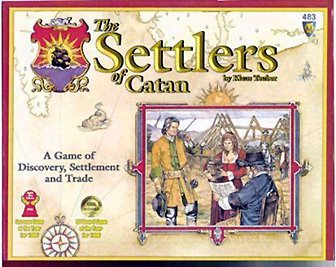Boardgames are popular in Germany, so winning the title "Spiel des Jahres" (Game of the Year) awarded each July is a big coup for the lucky designer and publisher. How big? The winner can expect a boost in sales of around a quarter-million copies. Even being nominated creates priceless awareness for those games.
 The "Spiel des Jahres" (or SdJ for short) has been awarded since 1979. The award maintains its independence by being financed exclusively from contributions and license fees for the "Spiel des Jahres" emblem. The judging criteria for the awards are: Game concept (originality, playability, game value), rule structure (composition, clearness, comprehensibility), layout (box, board, rules), and design (functionality, workmanship). The winning games have ranged from the tactical to bluffing games to dexterity games.
The "Spiel des Jahres" (or SdJ for short) has been awarded since 1979. The award maintains its independence by being financed exclusively from contributions and license fees for the "Spiel des Jahres" emblem. The judging criteria for the awards are: Game concept (originality, playability, game value), rule structure (composition, clearness, comprehensibility), layout (box, board, rules), and design (functionality, workmanship). The winning games have ranged from the tactical to bluffing games to dexterity games.The winner for 2005 is Niagara, by Thomas Liesching. Niagara is an innovative game where the board is placed over the box and features clear discs on which players' boats rest and move down the river and towards the dangerous falls at the edge of the board. Zoch, a publisher known for creative games, mostly for children, and feature quality wooden game components, is the German publisher and is available in English by Rio Grande Games.
 The first winner in 1979 was Hase und Igel (which literally translates to "Hare and Hedgehog" based on a German fairy tale but was released here by Rio Grande Games as Hare and Tortise) by David Parlett. This is an original race game with no random element. Players are bunnies. They spend carrots to move forward and gain them by moving backwards onto hedgehog spaces. Each bunny must eat three heads of lettuce and arrive home with no more than ten extra carrots. It sounds childish but this is a surprisingly tricky race game.
The first winner in 1979 was Hase und Igel (which literally translates to "Hare and Hedgehog" based on a German fairy tale but was released here by Rio Grande Games as Hare and Tortise) by David Parlett. This is an original race game with no random element. Players are bunnies. They spend carrots to move forward and gain them by moving backwards onto hedgehog spaces. Each bunny must eat three heads of lettuce and arrive home with no more than ten extra carrots. It sounds childish but this is a surprisingly tricky race game. The 1986 SdJ winner was Heimlich & Co. by Wolfgang Kramer. Released in English by Rio Grande Games as Top Secret Spies, this is a game where the players are randomly assigned an identity that is known only to them. On their turn, players roll dice and may move agents of their choice. The agent tokens score based on location. However, about two-thirds of the way through, players will vote on the identities of the other players. Correct guesses are worth sizeable points, so players should mask their true identities for most of the game and observe others carefully if they want to win.
The 1986 SdJ winner was Heimlich & Co. by Wolfgang Kramer. Released in English by Rio Grande Games as Top Secret Spies, this is a game where the players are randomly assigned an identity that is known only to them. On their turn, players roll dice and may move agents of their choice. The agent tokens score based on location. However, about two-thirds of the way through, players will vote on the identities of the other players. Correct guesses are worth sizeable points, so players should mask their true identities for most of the game and observe others carefully if they want to win.There are lots of great winners worth mentioning from the 1990s, but I'll go with the game that brought the designer game from Germany to the US in a big way, 1995's winner, Die Siedler von Catan (The Settlers of Catan) by Klaus Teuber. This game has sold millions of copies worldwide and a decade later still holds plenty of appeal. Players are trying to have the most successful settlement on the island of Catan. By building houses, they may obtain the resources needed to build roads and more houses, and to upgrade their settlements to cities. What determines what areas will produce are numbers from 2 to 12 on each area and a pair of dice. Each player begins their turn by rolling the dice and what number is rolled produces for all players. Players may trade goods as they race to be the first to ten victory points. This is a great game with lots of interesting decisions and fun built in and a ton of replay value. Settlers of Catan is part of a series of Catan games published in English by Mayfair Games.
 These games should be available locally at a specialty game shop. Online, I'd suggest going to Google, click on Froogle and search for the game by name.
These games should be available locally at a specialty game shop. Online, I'd suggest going to Google, click on Froogle and search for the game by name.Photo credits: Hare & Tortise ©2006 Mark Blanco, used with permission. Top Secret Spies ©2006 Robert Hawkins, used with permission. Settlers of Catan ©Mayfair Games.
Ward Batty is a long-time game-player who has been with the same weekly game group for over twenty years. "I understood there was a pension." is his excuse. He writes a monthly column on the business of board games for Comics & Game Retailer magazine and has written articles and reviews for The Games Journal, Scrye, Knucklebones and Games International.
The Game Table is a weekly column which is self-syndicated by the author. If you would like to see this column in your local newspaper, please write the managing editor of the paper. Interested in carrying The Game Table in your paper, please contact Ward Batty.
